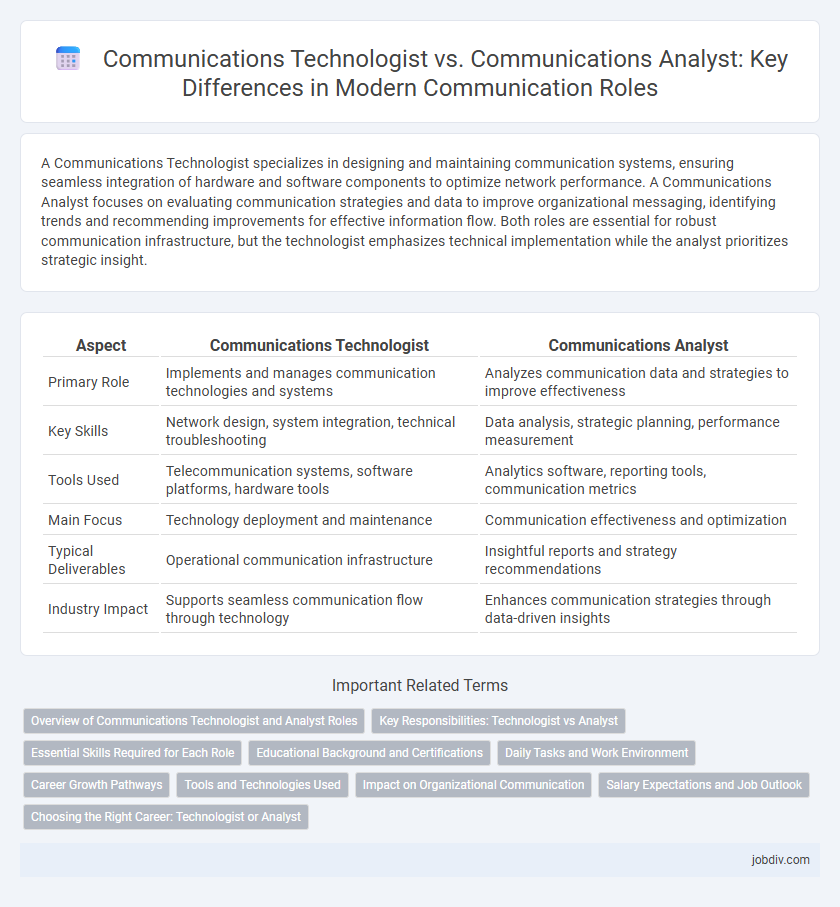A Communications Technologist specializes in designing and maintaining communication systems, ensuring seamless integration of hardware and software components to optimize network performance. A Communications Analyst focuses on evaluating communication strategies and data to improve organizational messaging, identifying trends and recommending improvements for effective information flow. Both roles are essential for robust communication infrastructure, but the technologist emphasizes technical implementation while the analyst prioritizes strategic insight.
Table of Comparison
| Aspect | Communications Technologist | Communications Analyst |
|---|---|---|
| Primary Role | Implements and manages communication technologies and systems | Analyzes communication data and strategies to improve effectiveness |
| Key Skills | Network design, system integration, technical troubleshooting | Data analysis, strategic planning, performance measurement |
| Tools Used | Telecommunication systems, software platforms, hardware tools | Analytics software, reporting tools, communication metrics |
| Main Focus | Technology deployment and maintenance | Communication effectiveness and optimization |
| Typical Deliverables | Operational communication infrastructure | Insightful reports and strategy recommendations |
| Industry Impact | Supports seamless communication flow through technology | Enhances communication strategies through data-driven insights |
Overview of Communications Technologist and Analyst Roles
Communications Technologists design, implement, and manage communication systems to ensure efficient data transmission and network performance. Communications Analysts evaluate communication strategies, analyze data flow, and recommend improvements to optimize organizational messaging and connectivity. Both roles require strong technical knowledge but focus differently on system development versus data interpretation and strategic planning.
Key Responsibilities: Technologist vs Analyst
Communications Technologists specialize in designing, implementing, and maintaining advanced communication systems, ensuring optimal network performance and integration of emerging technologies. Communications Analysts focus on evaluating communication processes, analyzing data to improve information flow, and developing strategies to enhance organizational communication effectiveness. Both roles require a deep understanding of communication frameworks but differ in technical execution versus strategic assessment and planning.
Essential Skills Required for Each Role
Communications Technologists require strong technical expertise in network systems, telecommunications protocols, and digital media platforms to design and maintain effective communication infrastructures. Communications Analysts excel in data interpretation, strategic planning, and stakeholder engagement to evaluate communication effectiveness and optimize messaging strategies. Both roles demand proficiency in collaboration tools and an understanding of information flow within organizations, but technologists emphasize system functionality while analysts focus on analytical and interpersonal skills.
Educational Background and Certifications
Communications Technologists typically hold degrees in information technology, telecommunications, or computer science, often supplemented by certifications such as Cisco Certified Network Associate (CCNA) or CompTIA Network+. Communications Analysts usually possess degrees in communications, business, or marketing, with certifications like Certified Communications Professional (CMP) or Digital Marketing certifications from platforms like Google or HubSpot. The educational background and certifications for each role reflect their focus, with Technologists emphasizing technical and network expertise, while Analysts prioritize strategic communication, data analysis, and stakeholder engagement skills.
Daily Tasks and Work Environment
Communications Technologists primarily focus on managing and maintaining communication systems, including installing and troubleshooting hardware and software in network infrastructures, often working in technical environments such as data centers or IT departments. Communications Analysts analyze communication data and strategies, assess organizational communication effectiveness, and develop plans to enhance messaging, typically operating within marketing or corporate communications teams. Both roles require collaboration but emphasize different daily tasks--technical systems management for technologists versus data-driven strategy development for analysts.
Career Growth Pathways
Communications Technologists specialize in designing and implementing communication systems, often advancing towards roles in network architecture or cybersecurity management. Communications Analysts focus on data interpretation and strategy development, with career growth leading to senior analyst positions or communications strategy leadership. Both pathways offer opportunities in technology integration and strategic decision-making within diverse industries.
Tools and Technologies Used
Communications Technologists primarily specialize in implementing and maintaining advanced communication systems using software such as Cisco VoIP, Avaya, and Microsoft Teams, alongside hardware like routers and switches. Communications Analysts focus on data analysis and reporting tools including Excel, Tableau, and communication platforms like Slack and Zoom to assess communication effectiveness. Both roles leverage analytics software, but Technologists emphasize system integration while Analysts prioritize communication data interpretation.
Impact on Organizational Communication
Communications Technologists improve organizational communication by implementing advanced digital tools and infrastructure, enhancing real-time collaboration and data sharing across departments. Communications Analysts evaluate communication workflows and gather data to identify gaps and inefficiencies, enabling strategic improvements in message clarity and employee engagement. Their combined efforts optimize information flow and support effective decision-making within organizations.
Salary Expectations and Job Outlook
Communications Technologists typically earn a median salary ranging from $60,000 to $90,000 annually, reflecting their specialized skills in managing and optimizing communication systems. Communications Analysts generally have a salary range of $55,000 to $85,000, with demand driven by businesses seeking to interpret communication data for strategic decision-making. Job outlook for Communications Technologists is projected to grow by 7% over the next decade, while Communications Analysts are expected to see a 6% growth, both influenced by increasing reliance on digital communication platforms.
Choosing the Right Career: Technologist or Analyst
Choosing between a Communications Technologist and a Communications Analyst depends on whether you prefer hands-on technical roles involving network infrastructure, signal processing, and telecommunications systems, or strategic roles focused on data analysis, market research, and optimizing communication strategies. Communications Technologists often work with hardware, software, and system installations, emphasizing technical problem-solving and innovation. Communications Analysts concentrate on interpreting communication metrics, audience insights, and developing actionable recommendations to enhance organizational messaging effectiveness.
Communications Technologist vs Communications Analyst Infographic

 jobdiv.com
jobdiv.com